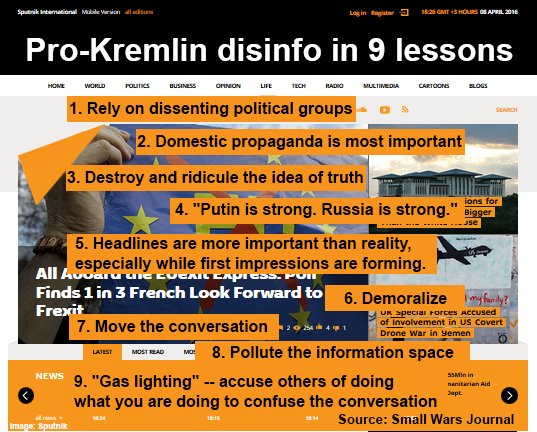Weekly update on Kremlin disinformation efforts in Europe
- Three senior editors at the Russian RBC media group controlled by Russian billionaire Mikhail Prokhorov announced that they were resigning, allegedly due to a disagreement with the management. According to the New York Times, they were under pressure from the Kremlin for reporting details about the family and friends of President Vladimir Putin.
- In an opinion article about Russian efforts to harm and destabilize Germany as part of a hybrid warfare targeting the legitimacy of the European government, the European version of Newsweek quoted our recommendation for German Federal Academy for Security Policy to create a national STRATCOM team as a “good idea”.
- Sputnik news website published an article stating that “One Third of Europeans and Americans Consider Crimea Part of Russia.” The Kremlin-owned news agency commissioned a poll asking residents in several European countries and the US to whom they thought the peninsula belonged. According to Deutsche Welle, “the poll is part of an ongoing strategy aimed at showing opinion poll-driven European countries that their voters are not overwhelmingly against Russia and its policies.”
- According to the official NATO statement, the Information and Press Department of the Ministry of Foreign Affairs of the Russian Federation used partial quotes and twisted the facts in their comment on the alleged statements by General Petr Pavel, Chairman of the NATO Military Committee. The Russian Ministry called General’s statements regarding the Eastern threats “false and unethical”.
- Russia’s official government publication Rossiyskaya gazeta published a story claiming that The Washington Post was calling for a stop to all financial assistance to Ukraine until all corrupt government officials are removed from power. According to org, this claim is completely inaccurate, The Washington Post did not call for Ukraine aid to be cut and Rossiyskaya gazeta selected only one point from the article, deliberately omitting the rest of the text.
- Pro-Kremlin media in Europe became particularly concerned about the alleged grim reality of life in the West. The main target seems to be NATO and its member states which pose a threat to Russia’s national security, according to the official Kremlin narrative. Read more in the latest EEAS StratCom Task Force Disinformation Review.
Kremlin Watch reading suggestions
The Russian Cyber Threat: Views from Estonia; by Patrik Maldre from the Center for European Policy Analysis
Cyber threat actors with links to Russia target NATO members on a daily basis. Tactical activities are carried out in pursuit of strategic objectives which in the long term include undermining and, if possible, helping to dissolve the EU and NATO. Moscow also aims to foster politically divided, strategically vulnerable, and economically weak societies on its periphery in order to boost its own ability to project power and influence on those countries’ decisions. Among other things, cyber capabilities can be used to carry out influence operations, including the use of propaganda and social media that undermine trust between citizens and the state create confusion and dissatisfaction among the population. Preventive measures and countermeasures exist at the personal, organizational, national, and international levels but they must be complemented by a cohesive strategy of deterrence-by-punishment by individual countries as well as like-minded allies.
Euroatlantic Experts on Disinformation Warfare
- Janek Lasocki discusses the role of propaganda in the upcoming Duma Elections in Russia in the Open Democracy article.
- Article in The Economist describes how Syria still provides a useful stage for Russian strategy and propaganda.
- James Johnson writes for Ground Report about the Russian influence on education in Donbass.
- Christian Kvorning Lassen writes about Russian influence on the political parties in the Czech Republic for Charter97.org
Tweet of the Week
Pro-Kremlin disinformation in 9 lessons by @Roman_Skaskiw in @smallwars: https://t.co/PVjOYWUJgE pic.twitter.com/G9XmRo34HC
— EU Mythbusters (@EUvsDisinfo) 16 мая 2016 г.
Current state of pro-Kremlin scene in the Czech Republic
- Many Czech pro-Kremlin websites highlighted the Russian military superiority last week, mostly referencing Western mainstream media. They informed that the new Russian Sarmat missile should cause concerns among Western military leaders and warned that NATO would not be able to use its Spearhead forces in Eastern Europe in case of a potential conflict with Russia.
- Some of the disinformation websites also took a shot at the Czech NGO HateFree accusing it of deceitful efforts to achieve stricter laws against hate speech towards immigrants and foreigners.
- Many websites criticised the Czech Minister of Culture Daniel Herman for visiting a Sudeten German congress, calling it a manifestation of our “servant international status”.
Kremlin Watch is a strategic program of the European Values think-tank, which aims to unravel and confront instruments of Russian hybrid war which is focused against liberal-democratic system. Find out more at www.europeanvalues.net/





